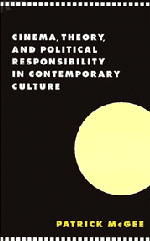Book contents
- Frontmatter
- Contents
- Preface
- Acknowledgments
- List of abbreviations
- 1 Redeeming contradictions: from critical theory to cultural studies
- 2 Art as the absolute commodity: the inter-subjectivity of mimesis in Adorno's Aesthetic Theory
- 3 Sexual nations: history and the division of hope in The Crying Game
- 4 Deconstruction and responsibility: the question of freedom in the place of the undecidable
- Bibliography
- Index
3 - Sexual nations: history and the division of hope in The Crying Game
Published online by Cambridge University Press: 06 July 2010
- Frontmatter
- Contents
- Preface
- Acknowledgments
- List of abbreviations
- 1 Redeeming contradictions: from critical theory to cultural studies
- 2 Art as the absolute commodity: the inter-subjectivity of mimesis in Adorno's Aesthetic Theory
- 3 Sexual nations: history and the division of hope in The Crying Game
- 4 Deconstruction and responsibility: the question of freedom in the place of the undecidable
- Bibliography
- Index
Summary
So perhaps there is hope for our divisions yet.
Neil Jordan, Introduction to The Crying GameThe culture industry
When I began writing this essay, Neil Jordan's film, The Crying Game, was still in release at theaters throughout the United States. One could argue that to make such a film the object of a critique whose method in some sense derives from Adorno's Aesthetic Theory undermines the spirit of Adorno, who once described the culture industry as a form of mass deception. This thought carries even more weight if one keeps in mind that the success of The Crying Game is in part the result of an ingenious advertising ploy. I remember hearing about this film on National Public Radio shortly before its release. The reviewer faithfully explained that he could not reveal the plot of The Crying Game because it contained a number of unexpected reversals. The point, he seemed to suggest, is that you never really know what the film is about; with each reversal, it changes directions so dramatically as to call into question the meaning of what has happened up to that point. Beyond this observation, the reviewer revealed nothing except that the film involved the Irish Republican Army, Northern Ireland, and a hostage.
For the next few months, before I saw the film, I was fascinated to see how it compelled silence from spectators and reviewers alike on what soon came to be known as the secret of The Crying Game. Already a few skeptical critics were saying that the film's secret was just a gimmick, but even they refused to give the secret away.
- Type
- Chapter
- Information
- Publisher: Cambridge University PressPrint publication year: 1997



